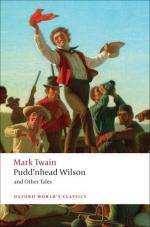Yesterday—I keep calling it yesterday, which is quite natural, for certain reasons—the instrument remained unused, and that also was natural, for it was the eve of the execution day. It was spent in tears and lamentations and farewells. The governor and the wife and child remained until a quarter-past eleven at night, and the scenes I witnessed were pitiful to see. The execution was to take place at four in the morning. A little after eleven a sound of hammering broke out upon the still night, and there was a glare of light, and the child cried out, ‘What is that, papa?’ and ran to the window before she could be stopped and clapped her small hands and said, ’Oh, come and see, mamma—such a pretty thing they are making!’ The mother knew—and fainted. It was the gallows!
She was carried away to her lodging, poor woman, and Clayton and I were alone—alone, and thinking, brooding, dreaming. We might have been statues, we sat so motionless and still. It was a wild night, for winter was come again for a moment, after the habit of this region in the early spring. The sky was starless and black, and a strong wind was blowing from the lake. The silence in the room was so deep that all outside sounds seemed exaggerated by contrast with it. These sounds were fitting ones: they harmonised with the situation and the conditions: the boom and thunder of sudden storm-gusts among the roofs and chimneys, then the dying down into moanings and wailings about the eaves and angles; now and then a gnashing and lashing rush of sleet along the window-panes; and always the muffled and uncanny hammering of the gallows-builders in the court-yard. After an age of this, another sound—far off, and coming smothered and faint through the riot of the tempest—a bell tolling twelve! Another age, and it was tolled again. By-and-by, again. A dreary long interval after this, then the spectral sound floated to us once more—one, two three; and this time we caught our breath; sixty minutes of life left!
Clayton rose, and stood by the window, and looked up into the black sky, and listened to the thrashing sleet and the piping wind; then he said: ‘That a dying man’s last of earth should be—this!’ After a little he said: ‘I must see the sun again—the sun!’ and the next moment he was feverishly calling: ‘China! Give me China—Peking!’
I was strangely stirred, and said to myself: ’To think that it is a mere human being who does this unimaginable miracle—turns winter into summer, night into day, storm into calm, gives the freedom of the great globe to a prisoner in his cell, and the sun in his naked splendour to a man dying in Egyptian darkness.’




